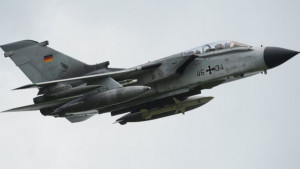
Germany plans to deploy Tornado reconnaissance jets to help the French air campaign against so-called Islamic State (IS) in Syria.
A naval frigate, satellite images and aerial refuelling will also be provided, the defence minister said.
However, it is difficult to take France and Germany’s fight against IS seriously for one obvious reason. Both nations are members of NATO, side-by-side the US and Turkey, Turkey who, even the Washington Post now admits, plays a central role in supplying IS in Syria.
The Washington Post’s article “Obama has strategy for Syria, but it faces major obstacles,” would blatantly report that:
They [the US] will increase air operations in northern Syria, particularly in the Turkish border area to cut the flow of foreign fighters, money and materiel coming in to support the Islamic State.
Careful readers will probably note that this is far from the first time such subtle admissions have been made. All during the Kurdish offensives seeking to retake border regions in Syria east of the Euphrates River from IS, US and European news agencies regularly noted how the loss of this territory by IS would constrict its supply lines from Turkey.
For France and Germany to send aircraft to bomb an enemy in Syria without addressing the very source of its weapons, equipment, money and fighters seems to be an almost intentional means of perpetuating a conflict or even expanding it, not ending it.
In contrast, Russia who is also fighting terrorists in Syria including IS, has openly condemned Turkey for its role in supporting terrorism inside Syria. Russia has even lost a plane in its growing confrontation with this NATO state sponsor of terrorism.
The question becomes, does France and Germany intend to truly solve the IS problem, or further compound it in league with nations like Turkey and the United States?
An Alternative
Without sending a single warplane or endangering a single pilot’s life, France and Germany could instead combine their considerable political clout to both expose and place pressure on Turkey to end its support for terrorists it is sponsoring inside Syria. Alternatively, if both nations are determined to commit military assets, they must do so in coordination with the only other nation in the region genuinely trying to eradicate these terrorist factions, Russia.
Not only that, instead of talking about a necessary “ground component,” implying that Western troops must inevitably enter into the Syrian conflict, France and Germany could commit to the most logical and obvious course of action, supporting the Syrian armed forces who are already on the ground, already fighting the terrorists and the only force in the region capable of managing a post-war Syria without the country turning into another Libya.
All For Show?
For France in particular, these options should appear particularly attractive (however unlikely they are to be explored or implemented) as a means to seek contrition for its actions in Libya, the destruction of the Libyan government and the ensuing chaos that followed giving rise both to the refugee crisis and the rise of IS itself.
France, by failing to do the right thing now, proves that it has no (and never had a) genuine intention of really fighting IS and instead seeks to contribute and take advantage of the growing global instability it itself helped spark during the events in Libya in 2011. It would also raise serious questions about the IS attack in Paris and why the French government appears disinterested in targeting this problem directly at its source and as soon as possible.
Regardless of which course France and Germany take, it will become obvious soon what their true agenda is. As the UK rushes to join the fray as well, the world must keep in mind those who fail to mention the source of IS’ power are likely not truly interested in defeating IS itself, but instead seek to use it as a tool to destroy yet another MENA region nation, achieve long-sought-after “regime change” in Syria and then move onward to their next victim.
Weepy candlelit vigils in the wake of horrific, fear-inducing terrorist attacks in Europe, can, if honest governments sit in power, rally people together to expose and dismantle the true source behind this terrorist scourge. Or they can serve as an empty show to manipulate the emotions of people to further pursue self-serving goals.
Was German Chancellor Angela Merkel and French President François Hollande’s posturing in the wake of the Paris attacks all for show? Or a realization that there is no future for either of their nations if they continue remaining silent or worse still, complicit in NATO’s global war of terror.
Ulson Gunnar, a New York-based geopolitical analyst and writer especially for the online magazine “New Eastern Outlook”.
